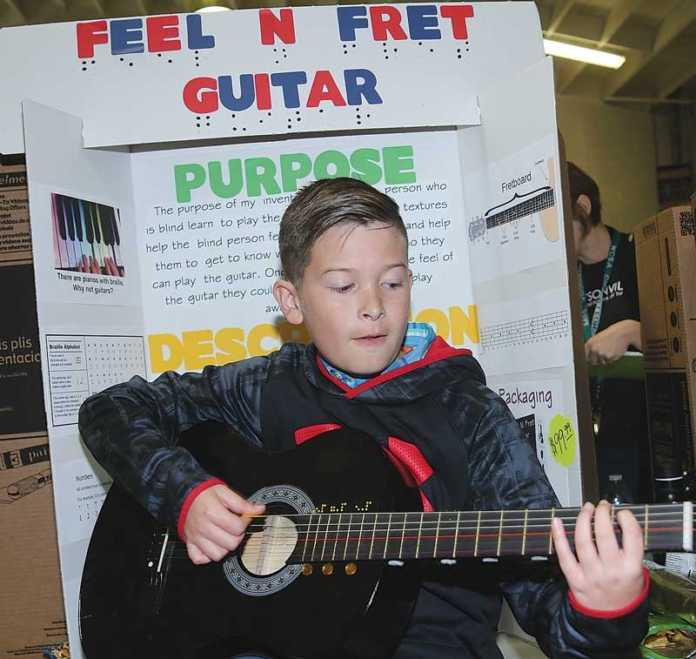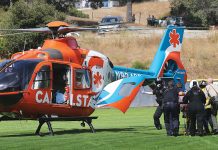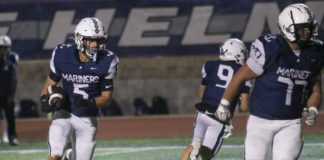WATSONVILLE — On some rainy day in the not-too-distant future, people who rely on glasses may have Laila Rubalcava to thank for helping to keep them dry.
The fourth-grader from Watsonville Charter School of the Arts (WCSA) has invented a small attachable rubber blade, similar to the windshield wipers on vehicles.
Laila said her own experience as an eyeglasses wearer inspired her creation. It was part of the school’s Invention Convention on Friday, an event for fourth-, fifth- and sixth-graders.
Nathan Flores, a fifth-grader, placed braille letters on the fretboard of a guitar as a way to help blind people learn to play.
“I was playing one day and I thought, ‘I like playing so much I want everyone to enjoy it,’” he said.
Navigating city streets could one day be a more pleasant experience thanks to sixth-grader Cy Harris and her “Smart Bump.”
These futuristic speed bumps would rise only if a speeder approached, while drivers obeying the speed limit would enjoy a smooth road.
Such an invention could also be useful for emergency services vehicles, she said.
Cy said her invention was inspired by a family trip during which her car traveled down a one-way street corrugated with speed bumps.
“That was not very fun,” she said.
Tired of stomping on recyclable cans and bottles as part of his chores, Daniel Esqueda, 10, invented the Crusher 3000, a large cylinder of concrete affixed to a pole that does the job for him.
“Now, two stomps and it’s done,” he said.
To prepare for the day, the students went through a 10-week course that showed them how to identify problems and find solutions, all while using curriculum aligned with Next Generation Science Standards.
The winning inventions will go to the state-level California Invention Convention in San Jose on April 14, where 80 judges will see 150 inventions.
Should their inventions pass muster there, they will go to the national convention on May 31 in Dearborn, Mich.
Organizers say it is not unusual to find students there with their own provisional patents for their inventions.
More importantly, bringing inventing to the classroom is a way to show students that the power to solve problems lies literally in their hands, said California Invention Convention Director Brenda Payne.
“We want to give students the skills they will need for the next years of their lives,” Payne said. “They will have jobs we can’t imagine, and they will need new skills we can’t imagine.”
WCSA Principal Amy Thomas said the project is about more than teaching students the process of inquiry.
“I hope they learn the process of failing,” she said. “I hope they keep learning perseverance, enjoy learning and enjoy creating.”
For his invention, Ramon Herrera, 11, wanted to stop his cat from climbing up the ladder onto his loft bed.
To do that, he created “No Pillow For Kitty,” a ladder with a series of rolling rungs to discourage forbidden feline forays.
But after four iterations of the project, the cat still managed to get into the bed.
“I guess my cat was just too smart,” he said.
Fifth-grade teacher Michelle Voorhees, who organized the event, said projects like Ramon’s were still successful, crafty kitties notwithstanding.
“The important thing is that the kids are able to follow an idea all the way through, including all the trials and tribulations they may encounter,” Voorhees said. “They can incorporate that into their later life.”
•••
The Invention Convention launched in 2016 at Pacific Elementary in Davenport, with 20 fifth- and sixth-graders.
In addition to WCSA, Starlight, Hall and Amesti elementary schools now participate in the event, along with nearly 20 schools in Santa Cruz and Santa Clara counties.
California Invention Convention is an affiliate of the nonprofit STEMIE Coalition, which combines science, technology, engineering and math with invention and entrepreneurship.
•••
The state Invention Convention on April 14 is in need of judges. For information, email Brenda Payne at br**********@***oo.com.
For information, visit cainventionconvention.org or www.stemie.org.












